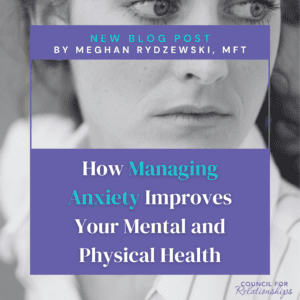Managing Anxiety & Mental and Physical Health Tips
CFR Staff Therapist Meghan Rydzewski understands that managing anxiety during periods of uncertainty can be difficult, especially when trying to balance both mental and physical health. She emphasizes the importance of grounding oneself through intentional self-care routines. These routines offer control over aspects of daily life, creating a stable foundation when life feels unpredictable. Read on to learn more.

Get matched with a CFR therapist.
How Daily Self-Care Routines Aid in Managing Anxiety & Enhancing Mental and Physical Health
One effective way of managing anxiety, a common mental health condition, is to develop a daily self-care routine. A self-care routine that you can use every day is important for maintaining good mental and physical health.
I suggest starting each day with simple habits like showering, brushing your teeth, and having a nutritious breakfast along with a glass of water. These basic actions help reduce anxiety because they provide predictability and comfort in everyday life.
Incorporating Exercise for Effective Anxiety Management and Boosting Mental and Physical Health
Beyond daily basics, managing anxiety also involves activities specifically tailored to your personal enjoyment and relaxation. Research shows that regular physical activity plays a vital role in improving both mental and physical health. Finding enjoyable physical activities such as walking, yoga, dancing, or sports can help ease anxiety disorders by promoting positive feelings and overall wellness.
Spending time outdoors is also beneficial in managing anxiety, offering a refreshing change of environment and connecting you with nature. Gentle yoga poses like child’s pose, downward dog, or corpse pose (Savasana) can specifically target anxiety reduction by promoting deep breathing and mindfulness.
Regularly scheduling these activities into your routine ensures consistency, which can be key in effectively managing anxiety and preventing physical health problems such as heart disease.
Journaling and Meditation: Essential Practices for Managing Anxiety and Promoting Mental and Physical Health
In addition to physical activities, journaling is another powerful tool for managing anxiety. Writing down your thoughts and emotions gives anxiety a designated place to go, reducing its ability to overwhelm you.
Journaling helps you process your feelings, allowing for greater emotional clarity and improved mental and physical health. You can use prompts like “Today I felt anxious because…” or “Something I did today that helped me manage my anxiety was…” to guide your journaling sessions.
Similarly, meditation provides a calming effect, helping you connect emotionally and physically, essential for managing anxiety effectively. Beginners might start with guided meditations or simple breathing exercises, such as inhaling deeply through the nose, holding briefly, and exhaling slowly through the mouth.
Recognizing Physical Symptoms: How Anxiety Impacts Your Mental and Physical Health
Anxiety doesn’t just impact your emotions; it also affects your physical body significantly. Common physical symptoms include headaches, muscle tension, upset stomach, and increased heart rate. Recognizing these physical signs is important in managing anxiety because it allows you to address symptoms early and practice relaxation techniques like stretching or deep breathing to reduce tension.
Strategies for Managing Sleep Anxiety to Support Better Mental and Physical Health
Sleep anxiety is another common mental health problem that can negatively impact mental and physical health. Many individuals find their anxiety levels peak at bedtime, making it difficult to fall or stay asleep.
To manage sleep anxiety, establish a consistent bedtime routine. Incorporate calming activities such as reading a book, gentle stretching, or listening to relaxing music. Reducing screen time before bed and maintaining a comfortable sleep environment also helps lower anxiety levels and promote restful sleep.
Managing Work-Related Anxiety: Protecting Your Mental and Physical Health in Stressful Times
Work-related anxiety is also widespread, especially during uncertain economic times. Symptoms might include constant worry about job performance, difficulty concentrating, and feeling overwhelmed by tasks.
To manage work anxiety effectively, it’s essential to set realistic goals, prioritize tasks, and take short breaks throughout the day. Practicing clear communication with supervisors and coworkers about workload expectations can also reduce feelings of uncertainty and anxiety.
Addressing Relationship Anxiety to Strengthen Your Mental and Physical Health
Relationships can also be sources of anxiety. Relationship anxiety symptoms often manifest as excessive worry about a partner’s feelings, constant reassurance seeking, or fear of abandonment. Effective management involves open and honest communication with your partner about your anxieties, setting healthy boundaries, and seeking support from a mental health professional if needed.
Addressing these symptoms directly helps maintain mental and physical health and fosters stronger, healthier relationships.
Types of Therapy That Help in Managing Anxiety and Improving Mental and Physical Health
Different types of therapy can significantly aid in managing anxiety disorders. According to the Diagnostic and Statistical Manual of Mental Disorders (DSM-5), Cognitive Behavioral Therapy (CBT) helps you identify and change negative thought patterns that fuel anxiety. Through CBT, you learn coping strategies and problem-solving techniques to better handle stressful situations.
Mindfulness-Based Stress Reduction (MBSR) therapy incorporates mindfulness practices such as meditation and yoga to reduce anxiety and improve overall well-being. Additionally, Acceptance and Commitment Therapy (ACT) encourages you to embrace your thoughts and feelings rather than fighting them, teaching acceptance and promoting actions aligned with your personal values.
Seeking mental health services from a professional can be an empowering step toward effectively managing anxiety.
Identifying Anxiety Triggers for Effective Anxiety Management and Sustained Mental and Physical Health
Recognizing anxiety triggers is essential for effective anxiety management. Triggers vary from person to person and might include specific situations, environments, or even people. Pay close attention to when your anxiety spikes, noting your surroundings, thoughts, and feelings at that time.
Once you recognize your triggers, you can proactively plan how to handle these situations differently. Techniques like grounding exercises, visualizing a calming scene, or using positive affirmations can significantly reduce your anxiety response when faced with triggers.
Building Long-Term Resilience: Essential for Managing Anxiety and Enhancing Mental and Physical Health
Building long-term resilience to anxiety involves strengthening your ability to cope with and bounce back from stressful situations. Resilience doesn’t mean avoiding anxiety altogether; rather, it means developing tools and strategies to navigate anxiety more effectively.
Practice positive self-talk, reminding yourself of your strengths and past successes in overcoming difficulties. Set realistic expectations for yourself and embrace uncertainty as a natural part of life. By gradually increasing your tolerance for uncertainty and stress, you become better equipped to handle anxiety proactively.
Editor’s Note: The views expressed in this blog are those of the author and do not necessarily reflect the official policy or position of Council for Relationships.
Learn More and Take the Next Step
Managing anxiety is a journey—and you don’t have to go it alone. Whether you’re looking for expert guidance, helpful resources, or a deeper understanding of mental and physical health, CFR is here to support you every step of the way.

Request a therapy appointment with Meghan.
About the Author
Meghan Rydzewski, MFT, is a Staff Therapist at Council for Relationships. Meghan specializes in helping individuals, couples, and families navigate life’s challenges by managing anxiety and promoting holistic mental and physical health. Her empathetic approach and personalized therapy methods empower clients to build resilience and find balance. To schedule an appointment with Meghan, visit her profile on our website.
More from CFR
Interested in reading more tips and insights from our expert therapists? Check out our other blogs for valuable information on managing anxiety, relationships, and overall mental and physical health. Don’t forget to sign up for our newsletter to stay updated on the latest articles, therapy resources, and events from Council for Relationships.
Ready to take the next step? Get matched with one of CFR’s 60+ therapists and psychiatrists today to find personalized support for your mental and physical health needs.
Managing Anxiety & Burnout: Mental Health Tips for College Students
Building Self-Love: Small Steps for Mental Health & Confidence
Emotional Regulation: Everything You Need to Know to Improve Your Relationships
